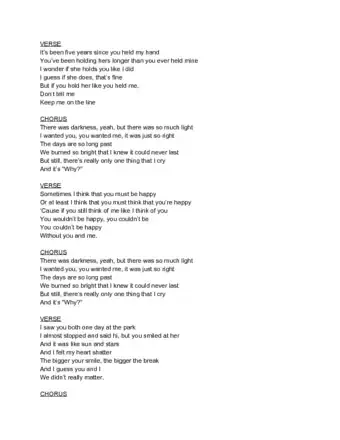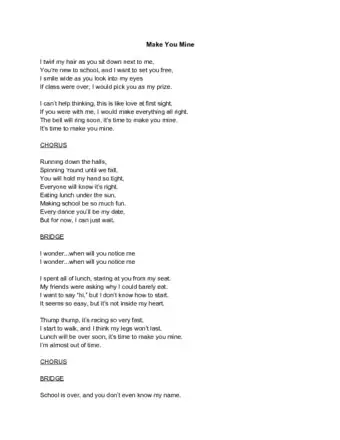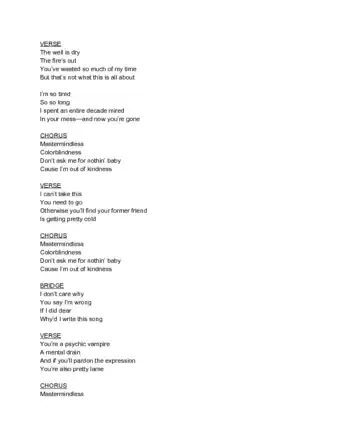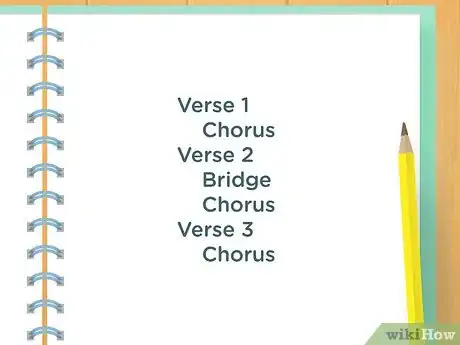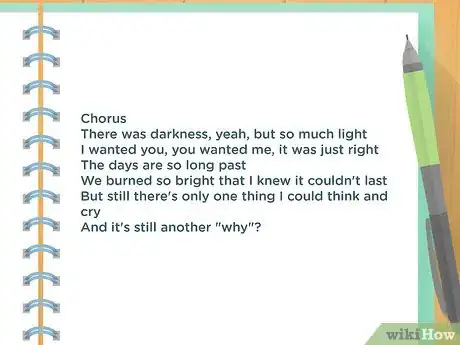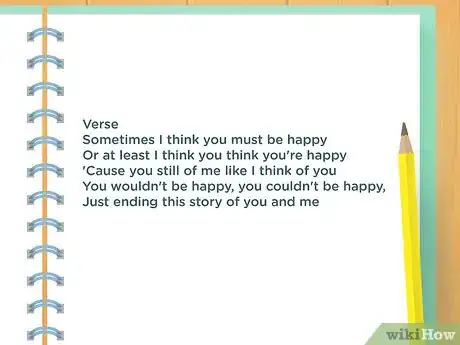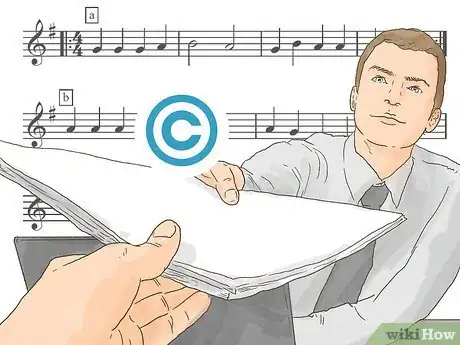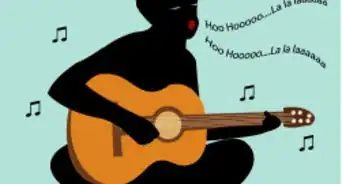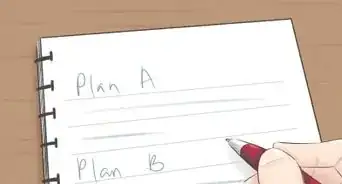X
This article was co-authored by wikiHow Staff. Our trained team of editors and researchers validate articles for accuracy and comprehensiveness. wikiHow's Content Management Team carefully monitors the work from our editorial staff to ensure that each article is backed by trusted research and meets our high quality standards.
This article has been viewed 117,221 times.
Learn more...
A personally written song makes an amazing present that's sure to be treasured. A song shows that you're creative, thoughtful, and value the recipient enough to give the gift of your time, skill, and effort. Learning how to write lyrics, compose a melody, and present your song can help you make your loved one's day!
Steps
Sample Songs
Part 1
Part 1 of 3:
Writing Lyrics
-
1Find out their favorite kind of music. Your country-music-fan mom probably won’t appreciate a pop song as much as your boyfriend who listens to pop all day. You don’t have to write your song in a style you don’t like or don’t know much about, but writing it in a genre your recipient likes is a good way to make sure they like your song!
-
2Figure out what you want to say. Writing a song will be much easier if you know what you want to say to them. You don’t have to start writing lyrics right away, but take a few minutes to write down your favorite things about them, how they make you feel, and why you want to write them a song.
- Write a list of your top ten favorite things about them. It's a great way to get you thinking about why they're so great!
- Try the opposite tactic too--write down why you want to write this song in six words or less. This can help you get to the main point quickly!
- If you can, talk to other people who know the recipient. They might have some ideas you can use.
Advertisement -
3Choose the most important thing you want to say. Read over your list of favorite things, and pick out the most important, essential thing you want to say. This can be something very simple, like a general "I love you." Use this as the basis for your chorus.
-
4Determine your song structure. Most songs have three different verses, each followed by a chorus that is usually louder and faster, and usually remains the same throughout the song. You can also include a bridge, which is a section between the verse and the chorus to make the transition sound better. If you want your song to be longer or more complex, you can include a middle 8, which can be a different set of lyrics or even a music solo. Remember, your song structure is entirely up to you!
-
5Write a chorus to your song. The chorus should be short--about four lines or chords is a good guideline. It should be catchy and memorable, so keep it simple and fun. Your chorus doesn't have to rhyme, but it's often easier to write a rhyming chorus.
-
6Write song verses. Your verses lead up to and support your chorus. They can be longer, have more detail, and be more personal than the chorus.
- If your chorus is about how you wish your crush would notice you, write verses that talk about why you like them and how being apart from them makes you feel.
- Try to write verses that follow a rhythm. Each line should have about the same number of syllables, and you should be able to put the same emphasis on the last syllable of each line. These syllables will form the beats to your melody, so make sure each line matches the others. Rhyming isn't required, but it can make forming a rhythm easier.
- A good rule of thumb is that a verse should be about twice as long as your chorus.
-
7Go through several drafts. Don’t expect to write the perfect song on your first try. It’s okay to write several drafts of a song--in fact, it will make your song even better!
- If your lines all have different lengths, edit them until they all have the same length. For example, if you have two lines that read "I love her more than words can say.I love the way she celebrates with me every day," you should take five syllables out of the second line.
- Think about what your chorus says, and take out any verses that don't support the chorus. If your chorus is about how your best friend saved your life, you can probably delete lines about your best friend's dog.
Advertisement
Part 2
Part 2 of 3:
Composing Your Song
-
1Choose your instrument. You can just sing your song a Capella if you want, but if you want to include instruments, choose which ones you’ll use before you start writing. If you plan to use multiple instruments, you’ll need to either find other musicians to play with or make sure you have access to recording software that can layer each instrument together.
-
2Experiment with composing techniques. Some people prefer to sing their lyrics out loud to figure out the best melody, while others like to improvise on their musical instruments. Try both to determine which works best for you as a songwriter.
- It's okay if you don't know how to read music--plenty of famous musicians don't! If you can't write your melody down, keep practicing it until you have it memorized.
-
3Write a melody. What kind of melody you write depends on your preferences, but there are some general tips. You don't have to actually write it down, but you should definitely memorize it.
- Repetition is important, but don’t be too repetitive! Your melody should regularly repeat the same sounds to give the song some structure, but don’t overdo it--too much repetition can be annoying.
- Up-and-down melodies tend to be very pleasing. Don’t just make your song go up in tone, bring it down and then up again.
- Make sure your melody flows. If you want to go from a very low note to a very high note, put a few medium-tone notes in between--jumping around can make your melody sound jarring.
- Try to match each beat in your melody to a syllable in your lyrics.
-
4Experiment with your melody and lyrics. Try playing your melody alone for a while, then adding in the lyrics. If something doesn't sound right or your lyrics don't fit, feel free to change them!
Advertisement
Part 3
Part 3 of 3:
Presenting Your Song
-
1Practice your song repeatedly. Don’t immediately get up from writing and play your finished song at your recipient’s party. Practice it a few times on your own so you know it well. This is especially important if you plan to perform it live!
-
2Perform your song for someone else. Let someone else hear the song before the person you wrote it for. If your song would hurt or embarrass the recipient, is inadvertently copied from a popular song, or needs some more work, it’s best to find out before showing it to everyone.
-
3Play your song for the recipient. If you want, you can perform your song live for the person you wrote it for. If you do this, try to make it special--wear something that adds to your performance, and make sure you’ve practiced first!
-
4Record your song. If you want to make a recording of your song, you have several options.[1]
- Have someone take a video of you performing. If you do this, make sure they have a high-quality camera--a cell phone won’t look or sound as good.
- Use recording software at home. You can buy a program or use a free online-based recording site.
- Go to a professional studio. You can hire a pro to record your song too--smaller record labels often rent studio time, and some areas even have walk-in studios.
-
5Choose a format. You can send a music file or a link to a streaming song, or give a physical copy like a CD, cassette, or record. The format you choose will determine the process for finalizing it--sending a file can be done very quickly, but pressing a vinyl record may take a few weeks.
-
6Check the recording. Make sure your recording is high quality before you give it as a gift. Check for static, skipping, cut off lyrics, or poor sound quality. Make sure you listen to the entire recording--there might be a mistake at the very end! If you’re giving a CD, make sure it’s compatible with car and computer stereos.[2]
-
7Give the recording as a gift. If you are sending them a file or posting it to a website, write a message about how much they mean to you. If it’s for a specific event, like a birthday, send your best wishes. If you’re giving a physical recording, like a CD or a vinyl record, design a nice cover or label for it.
-
8Copyright your song. In the United States and many other countries, the writer of a song automatically has a copyright. But if you want, you can take the extra step of formally registering your song by contacting your country’s copyright office in person, via mail, or online.[3]
Advertisement
Community Q&A
-
QuestionHow would I write a song for my friend's birthday?
 Nicole ReijonenCommunity AnswerYou could write about all the inside jokes you have; all the memories you've made; something you like/ love about them; or base the song off the Happy Birthday song. They should like that.
Nicole ReijonenCommunity AnswerYou could write about all the inside jokes you have; all the memories you've made; something you like/ love about them; or base the song off the Happy Birthday song. They should like that. -
QuestionHow do I find the right feelings to write a song for my best friend?
 Community AnswerSit, relax, and think about your best friend. Let the feelings flow freely. Write down any words, phrases, or sentences that come to mind; whatever you want to say to him/her. After writing everything down, you can now review and reorganize the words to form a proper poem or song.
Community AnswerSit, relax, and think about your best friend. Let the feelings flow freely. Write down any words, phrases, or sentences that come to mind; whatever you want to say to him/her. After writing everything down, you can now review and reorganize the words to form a proper poem or song. -
QuestionWho keeps the copyrights to a song?
 Community AnswerThe copyrights to a song usually belong to those involved in writing it.
Community AnswerThe copyrights to a song usually belong to those involved in writing it.
Advertisement
References
About This Article
Advertisement
